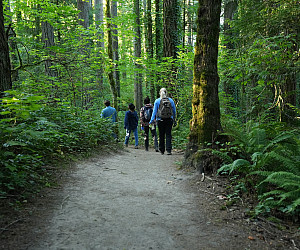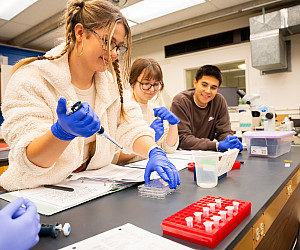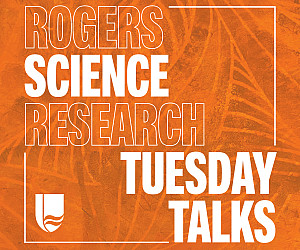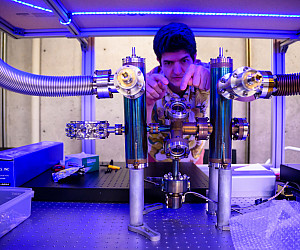2023 Rogers Science Research Tuesday Talks
Student-faculty collaborative research

Students discuss their research projects during a series of talks on Tuesdays in June and July. Each presentation is 15 minutes, plus time for questions. There are generally three talks per session.
Tuesdays 1:00 - 2:15 pm
Olin 301
May 30
Responsible Conduct of Research
Discussion and previously recorded presentation by Sarah Shaack, Reed College
Please note that this face-to-face training is a required component of the College’s RCR policy and attendance will be taken.
June 6
Colloquium: Prioritizing Diversity, Equity, and Inclusion in STEM
June 13
Diversity and function of phospholipase D venom toxins in spiders
Student presenters: Madeline Jones, Sammy Kutsch
Faculty collaborator: Greta Binford
Rehearsing disaster: Understanding earthquake preparedness behavior in an interactive environment
Student presenters: Kat Berge, Nora Cesareo-Dense, Jake Darnell, Evan Eldridge, Sam Flores, Ismael Jaramillo
Faculty collaborators: Elizabeth Safran, Peter Drake, Erik Nilsen, Bryan Sebok
Studying mechanisms of Parkinson’s disease in zebrafish
Student presenters: Brandon Apresa, Brendan Creeks, Lily Schainker, Claire Zawadzki
Faculty collaborator: Tamily Weissman-Unni
June 20
Investigating how cells construct their internal compartments
Student presenters: Tyler Chan, Frances Courtemanche, Madeline Daniel, Makena Phillips
Faculty collaborator: Greg Hermann
Dependable Computing
Student presenters: Wyeth Greenlaw Rollins, Caitlyn Wilde
Faculty collaborator: Alain Kägi
Hands-on Cybersecurity Expercises and Timely Feedback Via Human-in-the-loop AI
Student presenters: Cole McCorkendale, Emily Tanabe
Faculty collaborator: Jens Mache
June 27
The dynamics of micro-swimmers: correlating optical force measurements with high-speed video microscopy of swimming algae.
Student presenters: Lily Johnson, Hugh Pettitt-Kenney
Faculty collaborator: Albert Bae
Urban Air Quality: Sources and Effects
Student presenters: Isaac Heintze, Karl Peterson
Faculty collaborator: Jessica Kleiss
Genetic factors of drug exposure effects in Drosophila melanogaster
Student presenters: Maddie Dopp, Cassidy Floyd-Driscoll, Avi Strok
Faculty collaborator: Norma Velazquez Ulloa
July 11
Noble Metal Nanoparticle Shape Control
Student presenters: Zane Mullally, Abigail Ramirez, Kenzie Stewart
Faculty collaborator: Anne Bentley
Exploring the Structural Basis of Dynein Regulation
Student presenters: Paul Cleary, AJ Di Nicola, Logan Hausler
Faculty collaborator: Nikolaus Loening
Transcriptional regulation of pluripotency in embryonic stem cells
Student presenters: Johnny Pang, Katya Schwieterman, Sarah Swanson, Jack Waite
Faculty collaborator: Sharon Torigoe
July 18
Colorblind ideology moderates worldview threat from racial passing behavior
Student presenter: Mary Prentice
Faculty collaborator: Diana Leonard
Glyphosate (Roundup) Degradation as a form for Phosphorus Recovery
Student presenters: Owen Beale, Mia Bell, Katie Caudill, Isabel Willis
Faculty collaborator: Louis Kuo
July 25
More information TBA
email timmins@lclark.edu
voice 503-768-7530
Opportunities in Science
Lewis & Clark
615 S. Palatine Hill Road
Portland OR 97219
More Stories

Nature Lab
Where the Wild Mice Are
This summer, several Rogers Science Program students immersed themselves in hands-on field work investigating the behavior of deer mice in Tryon Creek State Natural Area with Assistant Professor of Biology Tracy Burkhard―and found their career paths.

Research Opportunities
From Lab to Launch
Lewis & Clark’s John S. Rogers Science Research Program gave these young alumni scientists the skills—and the confidence—to soar into graduate programs nationwide.

2025 Rogers Tuesday Talks
Schedule of summer science research talks

Groundbreaking Science
A Quantum Leap for Physics Students
Ben Olsen, assistant professor of physics, is establishing Lewis & Clark’s first Quantum Information Science and Engineering lab to probe how unusual types of matter behave at the subatomic level. But first he and his students have to build “The Apparatus.”
